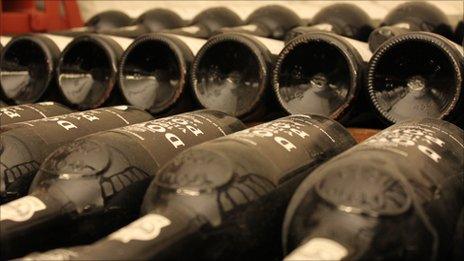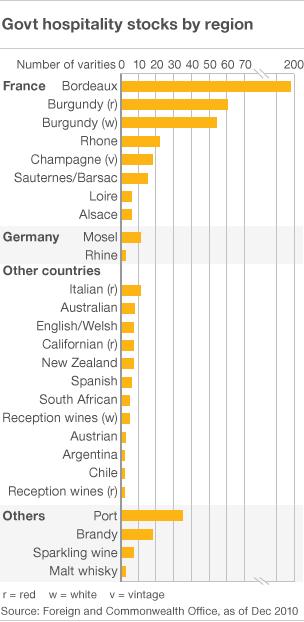Secrets of the government's £2m wine cellar
- Published

The government has, until recently, kept the contents of its wine cellar a secret. A rare tour reveals some vintage treasures.
It lies beneath a grand London mansion, owned by the Queen and leased to the government. It contains around 39,000 bottles of wines and spirits. For years, details of what was in it were shrouded in secrecy, even though it has been funded by the British taxpayer.
Welcome to the Government's wine cellar.
Lancaster House is down the road from Buckingham Palace. It sits well in such a prestigious neighbourhood. However, the ornate grandeur of the public rooms stops at the door to a fire escape, which takes you down to the basement and to a service corridor.
A key is turned in a large wooden door. Step inside and the temperature drops considerably. A short alarm goes off to let everybody know there is a visitor.
The first thing you see is a large wooden table, which is made from an elm tree that blew down in St James's Park in around 1830.
There is a curved brick ceiling painted white and there are three corridors on each side. These are where you find the wine racks, stretching from floor to ceiling. If their contents were sold on the open market, they would raise a fortune.The Government's estimate is £2m.
Untouched for decades
The wines here are some of the finest you could possibly wish to taste. They are fit for prime ministers, presidents and kings and queens. In fact, those are exactly the kind of guests who are likely to have the chance to indulge their palates on the contents of the best bottles.

It has not been often that any journalist has been able to describe all of this, as access has been strictly limited. This unusual visit has come after months of trying and waiting.
All the wines and spirits have been bought over many decades. Some of the dust suggests certain bottles have not been touched for much of that time.
I pick up a bottle of the 1961 Chateau Latour. The palms of my hands become sweaty when I am informed how much it is worth. I am told that I will have to pay for it if I drop it. I have never put a bottle down so quickly, yet gently, in my life.
The head of government hospitality, Robert Alexander OBE, is watching carefully.
"This probably now has a market value of somewhere in the region of £4,000 and £10,000," he says, "depending on where you are selling it in the world."
"It was purchased for 51 shillings and five pence."
The most that has ever been spent on any single bottle for the cellar was around £100.
There is a row of vintage champagnes. There used to be 17 different types but that number is somewhat smaller now.
The 1878 Grand Fins Bois Cognac is said to be "excellent, superlative even - fiery and delicious".
I am drawn to a port, without a label. I am told it is a 1931 Quinta do Noval and is considered to be one of best of the 20th Century.
There are some intriguing clues in the cellar's stock list as to which wines the powerful prefer with their meals - whether British politicians or visitors.
Lady Thatcher described the 1961 Chateau Margaux as "silky".
A French delegation called the Corton 1961, Grand Cru, Cote de Beaune, Bouchard Pere et Fils "a national treasure".
Robert Alexander says not all of the wines are reserved for big state banquets and important visitors from abroad.
"The majority of our work does not involve heads of state. We're looking at ministerial hospitality hosted by ministers from a whole range of government departments and that's where most of wine is being deployed. It's not the top wines. It's the good standard reliable stock that we are using on a day-to-day basis."
The more expensive vintages are now unlikely to be consumed by any guest. During the course of the next year, around £50,000 worth will be sold in order to buy new bottles. This will be repeated over the subsequent three years. The government says the purchase of wine will now be "entirely self-financing". However, the day-to-day maintenance of the cellar will still be paid for by the tax payer.
The Foreign Office, which runs the wine cellar, says it seriously considered shutting it down entirely but that an 11-month review concluded that it remains the most cost-effective way of supplying wine for the government's various events.
Alas, the closest I came to any of the wine and spirits was picking up one of the bottles. I am not then as fortunate as some of the security officers, who accompany presidents and members of royalty when they visit London.
A Foreign Office official told me that some insist on tasting the wine before it is served up to the VIP they are looking after.
Apparently, it is to do with keeping the visitors safe, rather than being able to say they have tasted one of the best wines around.